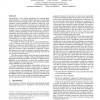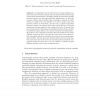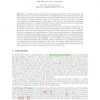PLDI
2012
ACM
11 years 7 months ago
2012
ACM
Linearizability is a key design methodology for reasoning about tations of concurrent abstract data types in both shared memory and message passing systems. It provides the illusi...
IACR
2011
12 years 4 months ago
2011
We put forward a framework for the modular design and analysis of multi-party protocols. Our framework is called “GNUC” (with the recursive meaning “GNUC’s Not UC”), alr...
ASIACRYPT
2011
Springer
12 years 4 months ago
2011
Springer
The assumption of the availability of tamper-proof hardware tokens has been used extensively in the design of cryptographic primitives. For example, Katz (Eurocrypt 2007) suggests ...
CRYPTO
2003
Springer
13 years 9 months ago
2003
Springer
Abstract. Cryptographic systems often involve running multiple concurrent instances of some protocol, where the instances have some amount of joint state and randomness. (Examples ...
CSFW
2007
IEEE
13 years 11 months ago
2007
IEEE
Task-PIOA is a modeling framework for distributed systems with both probabilistic and nondeterministic behaviors. It is suitable for cryptographic applications because its task-bas...
CSFW
2008
IEEE
13 years 11 months ago
2008
IEEE
Composition theorems in simulation-based approaches allow to build complex protocols from sub-protocols in a modular way. However, as first pointed out and studied by Canetti and ...



